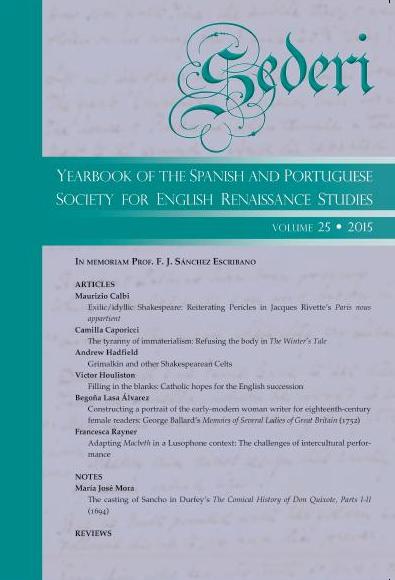Exilic/idyllic Shakespeare: Reiterating Pericles in Jacques Rivette's Paris nous appartient
Resumen
Jacques Rivette’s Paris nous appartient (1961) is about a literature student, Anne Goupil, who becomes involved with a group of bohemians centering around the absent figure of Spanish musician, Juan. The film incorporates the attempt by theatre director Gérard Lenz – in many ways a simulacrum of Rivette himself – to stage Pericles, even though this is a play that he himself defines as “incoherent” and “unplayable.” This essay explores the significance of this incorporation, and shows how the reiterated, fragmentary rehearsals of this “unplayable” play are essential to an understanding of the (disjointed) logic of the film as well as the atmosphere of conspiracy it continually evokes. It also argues that the “Shakespeare” included in the film is an “exilic Shakespeare” that does not properly belong, a kind of spectre haunting the film characters. This construct uneasily coexists with a version of “Shakespeare” that the film simultaneously emphasizes – a “Shakespeare” that takes place “on another level” (in Anne’s words), an idyllic and idealistic entity.Descargas
Descargas
Número
Sección
Licencia
The copyright holder of the published contributions is SEDERI.The hardcopy and an open-access version of the journal will be published simultaneously. The issues will be available online in the SEDERI website (http://www.sederi.org/yearbook/) and other repositories that have signed an agreement with SEDERI.
The authors who publish with this journal agree to the following terms:
a) SEDERI retains copyright of the essay.
b) If the author wishes to republish or rewrite the essay for another journal, or include the essay published in SEDERI in their personal repositories, or in any other way, they should contact the editors to obtain permission to do so. This will entail citing SEDERI as the original source and sending the editors a copy of the new version, or the link to the website, in case of online publishing.
The author(s) hereby warrant(s) that:
a) The essay submitted for publication is an original creation and does not infringe any copyright or property right of another journal, author or publisher.
b) The essay submitted for publication has not been previously published, whole or in part, and is not being considered for publication elsewhere.
c) Written permission has been obtained for any material from other sources included in the essay submitted for publication.




